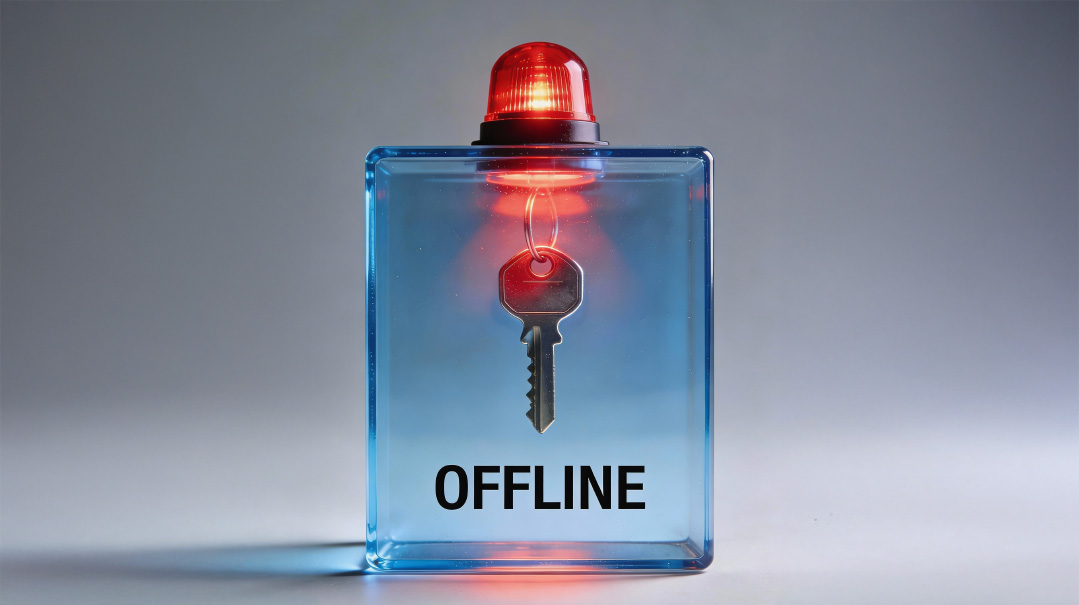Credit Crunch
| February 17, 2021“Me? Buy the business? I can’t even afford to pay my electricity bill"

Bentzy: I wish I could help you, but it isn’t so simple.
Gavriel: If you couldn’t help, why didn’t you say so right away?
GAVRIEL
Bills, bills, bills. It seemed like that was all Miri and I ever talked about.
It wasn’t always like this. I vaguely remembered that we used to spend time together talking about the kids, interesting customers I came across, and the latest family news. But ever since Miri went back to work after her last maternity leave, and with my increasingly longer hours at the warehouse, we barely had a chance to breathe, let alone a quiet hour to sit and talk. Our evenings were a hectic marathon of baths-bed-supper-baby, with Miri often heading back to the computer to clock in the rest of her hours, and me dashing out to catch a Maariv.
But we spoke about the bills, because they were urgent and in our face, one plain, forbidding envelope after the next: electricity, gas, tuition, credit card. There was the account at the grocery and new shoes for the boys and rent. Every night, it seemed, there was another crisis, another reason to frantically search through our dwindling accounts to try and scrape together the next payment.
“This is crazy,” Miri said to me one night. “We’re working and working and working, and we’re still drowning in these bills! How can life cost so much?!”
I agreed with her. But I was grateful that at least we both had decent jobs. I was managing a warehouse — and by extension, most of the sales and general operations — for an Amazon business, and Miri was a graphics designer for a large marketing company. With COVID and lockdowns, sales had skyrocketed at my job, and while Miri now worked remotely most of the time, she retained her job, too. We were lucky.
When my boss, Mr. Ferber, called me in a few days later, I wasn’t unduly nervous. We’d been working together for years, he trusted me implicitly, and everything had been going well at the warehouse. Still, it was strange for him to call me in for a whole official meeting. Even stranger was the serious look on his face.
“Gavriel, I have something to tell you,” he began, cutting straight to the point.
I nodded and waited.
“I’ve decided to sell the business.”
My mouth dropped open. I hadn’t seen this coming. Not in a million years. Mr. Ferber was going to sell the business when it was running so well? Did that mean a new boss? Or worse, was I going to be fired? Who said the next owner would—
“When?” I croaked out. “I mean — wow, that’s huge news. How come? And who’s buying it?”
Mr. Ferber finally smiled. “As soon as possible,” he said. “My wife and I have decided to take early retirement, and we’ll be relocating to Florida. We’re not young, you know.” He spread out his hands. “And while originally I’d been hoping to keep the business in the family, it doesn’t seem like it’s going to work out.”
Mr. Ferber’s daughter had made aliyah years earlier, and his son was a respected rebbi in a well-known yeshivah. I couldn’t imagine either of them taking over the business.
“And as for who’s buying it — well, I was actually hoping that you would.”
If I’d been shocked by his last announcement, now I nearly fell off my chair. “Me? Buy the business?” I can’t even afford to pay my electricity bill.
“Yes, you, of course you,” Mr. Ferber said, sitting up very straight and sounding a little annoyed. “Who else knows the business inside-out, who else wouldn’t need to be trained in, and most of all — who is someone that I want to give the business to? You’ve been with me since I started out, you know the ropes, you know the staff — if you want to buy me out, it’s all yours.”
I couldn’t turn this down without at least considering it from all angles. I was on a good salary as a manager, but a business owner? Of an established business? It wasn’t something I’d even dreamed of, knowing how long it could take and how risky it could be to set up a new business from scratch.
“How much?” I asked, holding my breath.
Mr. Ferber named a price. I let out my breath, thinking.
It was a good price. For a successful business, where I knew all the ropes, and could seamlessly transition from manager to owner. I could continue managing it myself too. It was virtually risk-free, a huge investment that would reap quick — and hopefully long-term — dividends.
I had ideas too, for expanding our product range, targeting different markets. There were things I’d thought of implementing for a while already, but Mr. Ferber preferred to stay low-key and risk-free. But once I was in charge, I could expand operations. I felt a thrill of excitement.
It didn’t take long to come to a decision.
“It’s saying no and risking losing my job, or saying yes and making the investment back in the future, hopefully many times over,” I told Miri that evening. We were talking money again, but for a change there was real excitement in my tone. “Yes, for a while we’ll be paying off whatever I borrow to buy the business, but after that…”
“Borrow?” Miri asked doubtfully. “I mean, it’s a lot of money you’re talking about. Do you think you could pay Mr. Ferber in installments?”
I shook my head regretfully. “I’d hoped to do that as well, but he wants the money up front. Probably for his condo in Florida, who knows?”
“So where will we borrow the money from?” Miri asked. “I mean, we’re making a bar mitzvah soon, and we’re still paying off the kids’ day camp fees… we don’t have that kind of money, Gavriel.”
I knew that. We barely had money for rent, braces for Tzvi, or Henny’s therapy.
“I’m going to have to ask someone for a loan,” I said slowly. We didn’t have any family that we could borrow from; Miri’s parents were in chinuch, mine had recently retired and had always had, at best, a modest income, and most of our siblings were either in kollel or struggling just like we were. But I did have one person to ask. Bentzy.
Bentzy was an old, old friend. We grew up together. We were chavrusas in yeshivah. We were still in touch. But a few years ago, Bentzy had suddenly “made it.” He was working in property and one day to the next, it seemed, he’d closed some lucrative deals, flipped a few properties, and was making big bucks. Rubbing shoulders with the major companies out there. Bought a lot, built a house, more like a mansion really. To his credit, he stayed the same nice guy who liked schmoozing at the shul kiddush Shabbos morning. But it was obvious that his standing in the community had changed. People took to hanging around him after davening, hoping to put in a good word for their fundraiser or mossad. There was a new respect, an unwritten “gvir” label branding him.
I’d never discussed money with Bentzy before. We had a good, old-fashioned friendship, even learned together on occasion, and there was no reason to let his business success get between us.
A couple of years back, Bentzy’s son was bar mitzvah. I’d taught him his leining and spent time preparing and reviewing his derashah. Bentzy paid generously — even adding a substantial tip when we finished preparing together — but he didn’t make a big deal of it, even though he knew how much the money meant to me.
So it took a lot of courage to make that call asking for a loan. I felt awkward and wrong, like I was shifting the balance of our whole relationship.
“There’s nothing embarrassing about asking for a loan,” Miri kept reminding me. “Businessmen do it all the time. You have a sensible repayment plan, you’re not asking for tzedakah… and besides, you helped his son so much. I’m sure he’ll be glad to repay the favor.”
“He paid me for that,” I countered, but inside, I was thinking the same thing.
Bentzy’s son was nothing like his father: He was shy, a little introverted, and had a lot of pre-bar mitzvah jitters. I hadn’t simply taught him his parshah — we’d worked through his nerves, done practice runs in the empty shul, and talked for hours, well beyond the official scheduled lesson times. I knew Bentzy appreciated that, and I hoped he would be happy to do a favor for me now.
When I finally make the call, though, it came out all wrong.
“A loan?” Bentzy asked. He sounded surprised — even distant. “How much? And until when?”
My voice came out a little breathless as I told him the numbers and my repayment plan. It would take a few months to get the business under control, and I explained how I hoped to repay in monthly installments. Miri was right; it was a good plan. I knew how business worked. I felt myself gain confidence as I explained.
“It’s just the initial outlay that’s impossible for me right now,” I confided. “I know it’s a lot of money, but really, even a loan for part of the amount would be a huge help. Half, maybe…” I trailed off.
Bentzy was still quiet. To be honest, I really needed him to lend me the entire sum, because I couldn’t think of anyone else to ask. But maybe if I had half the cash in hand, I would figure something out.
“I hear you,” Bentzy finally responded. He sounded noncommittal. “Let me get back to you.”
“Thanks,” I said, exhaling. I really needed the answer fast, but I got it, it was a big favor to ask for. I figured I’d give him a couple days to respond. Mr. Ferber wanted my answer next week.
When Bentzy didn’t respond right away, I decided to take it as a good sign. If he didn’t have the money, I reasoned, he would’ve said so right away. I assumed he was trying to work out how much he could lend me, or whether he could extend the full amount.
Eventually, though, I ran out of patience — and wondered whether he’d simply forgotten. I debated speaking to him after shul, but there was always a crowd around, and I felt uncomfortable. Instead, I sent a quick message just as I came into work one morning.
Any update re the loan?
Two blue ticks told me he’d opened the message, but I didn’t hear anything back.
Until two days later.
Mr. Ferber had left me a message the night before. Hi, Gavriel. I don’t mean to put you under pressure but I really do need an answer by tomorrow evening latest.
I wanted to buy the business. I was sure of that. It would be an incredible investment for me, for my family, for our future. But I needed the money, desperately.
That’s why, when Bentzy’s name popped up on my screen, I stopped in the middle of directing a shipment to open it.
I’m so sorry, I can’t help out at the moment. But I really hope it all works out for you.
That was it. No explanation, no apology for the long wait. No offer of a partial loan. No appreciation for our years of friendship and the fact that I’d lowered myself to ask.
Just a flat-out, in-my-face, refusal.
I had no idea how to reply.
And no idea what to do now.
If I could tell Bentzy one thing, it would be: It’s embarrassing enough to reach out for help; couldn’t you have given me the courtesy of a quick response, especially if you’re turning me down?
BENTZY
I think it was after the Bernstein deal that it started. The phone calls, the emails, the doorbell constantly ringing. Everyone I knew seemed to be involved in some campaign (every donation doubled for the next 36 hours!), or had a relative in desperate need, or wanted a loan to help make a wedding.
I was happy to help, I really was. It wasn’t that long ago that I was there too — in the famous “struggling-class” bracket — just trying to make ends meet and wondering how I’d ever manage to marry off my children. Even when the requests get overwhelming and time-consuming, I try to answer every one.
Sometimes, I feel like it’s a business in and of itself. Handling the calls, the emails, the Charidy campaign pages, just takes so much time. But I want to give, and so I make it work, juggling the office and the daf and my family and what my daughter Leah dubbed “Abba’s philanthropy.”
I laughed every time she said that, because although the business was doing well, I was far from a millionaire. No plaques in buildings or anything. But a loan for a family member or two, and a standard generous donation to various worthy causes — that was something I was happy to be able to offer.
Iwas surprised, though, when my good friend Gavriel called up, stammering awkwardly through his request for a loan. We’ve been close for years, and money has never been a part of our relationship, aside from when I paid him to tutor my son before his bar mitzvah. Yitzchak had been struggling to learn his parshah, and Gavriel, with his patient, calm approach, had been the perfect person to help him deal with the nerves as well as learn his leining and derashah thoroughly. He did a great job, and I paid him well — upping the standard rate a little because I knew he could use the extra income — but aside from that, we’ve never really talked about money matters. It just wasn’t part of our relationship. I was glad; it was one friend I could rely on who was in touch with me without angling for a donation. A throwback to the good old days where I was just another guy on the street, a regular kollel yungerman like hundreds of others, where I wasn’t my money and my time wasn’t public property.
It seemed, though, that the good old days had come to an end here too.
“I’m looking into making an investment, buying a business, it’s buying out my own boss, actually,” he told me, almost apologetically. “It’s a big investment, and I need the money up-front… I was wondering if, maybe, you would be able to lend it to me, I could do monthly installments to repay it. I have it all figured out…”
I asked him a few questions, numbers mostly. He was asking for a big loan, but then again, perhaps I could swing it. I wanted to make it work for him, especially in light of how much he’d done for Yitzchak.
But when I looked over the numbers later that day, in a brief lull between meetings, I saw that it wasn’t going to be simple. I was waiting for repayment on a number of “informal” loans, and when it comes to family and friends, getting the repayment on time is never as simple as it sounds. This brother had a sudden medical expense and couldn’t repay his loan as promised, and that cousin asked for an extra month, and then another… you know how it goes.
“That’s it — we need to stop with the loans,” Yael, my wife, grumbled to me one night, after she overheard me on the phone with a close family friend. “Didn’t he say he would repay by the first? And now it’s what, the 15th?”
“The 17th,” I answered automatically. Of the next month, was what I didn’t tell her.
“See?” Yael folded her arms. “You’re doing chesed here, it shouldn’t be coming at your expense. All those reminders… chasing after the borrowers… don’t they understand that you need the money back at the time they’ve promised?”
“It’s not like we need it urgently,” I tried placating her. “Baruch Hashem, we have everything that we need…”
“That’s not the point.”
Yael and I rarely disagreed, but this was something that really bothered her.
Truthfully, the loans I’d given out were a big deal, they were mostly for substantial amounts of money, and even though we didn’t need the cash in hand urgently, we definitely would need it eventually.
Now was definitely not the moment to bring up Gavriel and his request. Hopefully a couple of people would repay their loans within the next day or so, and I could broach the subject when Yael was feeling better about the whole thing.
After all, we did have the means. Why shouldn’t we help people who desperately needed it?
But it wasn’t so simple.
The family friend didn’t come through — again. My cousin who was hoping to repay a loan that same week called to ask me if I minded waiting another month. Did I mind? Well, did I have a choice?
Business was fine, we had the cash flow we needed, and Yael and I were well within our own budget. It wasn’t like I needed the money for myself. But there was Gavriel and that loan he’d asked for… and he’d already been waiting for three days.
The only way I could come through for him, I realized, was if I loaned him the money from a personal savings account. And for that, I needed Yael on board. This was about her, too, after all.
“It’s different with Gavriel,” I told her reassuringly, after I presented his request. “He’s a close friend of mine and a very yashrusdig person. Straight, honest, to the letter. We can even write up a contract. He’s not going to play games with the repayment.”
Yael didn’t buy it. “Look, I know all that, and I believe he’ll want to pay up as planned,” she said. “But this is a new venture for him, isn’t it? What if it fails? What if he simply can’t pay? I’m just worried that we’re going to take the shortfall again…”
“It’s an established business, he knows what he’s doing,” I reasoned. “He explained it to me in detail, he’s got a good head, I’m not worried.”
“But I am,” Yael said quietly.
I looked at her and realized she was actually worried. We’d lent out so much money to family and friends — big loans — and although I had no doubt that they would repay them, she wasn’t so sure.
I bit my lip. “Fine,” I said slowly. “I hear that. How about we say like this — I’ll see if the other people who’ve borrowed money are able to pay back in the next few days, and I’ll use that to lend to Gavriel? That way it would come from money we had anyway lent out, not from our savings account.” I knew the repaid loans wouldn’t cover the entire amount that Gavriel needed, but he himself had said a partial amount would be helpful.
Yael thought for a moment, then nodded. “I guess so. I’d like to help him out too. It’s just, I don’t want it to come at our expense, you know?”
I knew.
When Gavriel texted me for an update, I redoubled my efforts. I went through the list of loans I was waiting to be repaid for, and called each of the borrowers, even those who weren’t due to repay yet. Some were large loans, and others just a few thousand dollars, but I figured every little bit would help. Besides, if every last one of them came through — I would be able to cover Gavriel’s entire amount.
Okay, that was unlikely — maybe even impossible. But I was determined to try my best.
So I made the calls, sometimes trying a few times before I got through. The responses were all too familiar, though: I’m so sorry… hopefully next week… you said another month, no?… I really thought I would, but…
“Okay, no worries,” I told the last one, my brother Yaakov who owed me money since he’d made a chasunah last year. “It’s really okay. Whenever you can…”
“I will, Bentzy, it’s on my mind, it really is. I just literally don’t have the money right now.”
I knew he didn’t. And I felt bad that I’d put pressure on him, but I felt even worse for Gavriel.
“I guess I’m going to have to turn him down,” I told Yael that night. To be honest, I was sort of hoping she’d have a change of heart now that it was crunch time. “He was really desperate, though. I feel really sorry for him.”
“I do, too, but we can’t do chesed at the expense of our own family,” Yael said, standing her ground. “Besides, you need the cash flow, there are business expenses… we have too much money tied up in loans that don’t get repaid in time.”
She was right. I knew we couldn’t really offer such a large loan right now. But it was difficult to let him down.
I drafted my reply text so many times.
Hi Gavriel, I’m so sorry to let you down, I really tried to work things out, but —
I deleted it. Too apologetic.
Hi, sorry I didn’t respond earlier. I was trying to figure it out with other loans that —
I deleted that one, too. It wasn’t relevant, the other loans that weren’t being repaid. I mean, it was relevant to me, but I didn’t have to explain myself. Besides, it wouldn’t sound nice to hear that I’d lent money to several other people but didn’t have anything to offer him.
Finally, I settled on a short response that I hoped let him know that I felt bad, but simply was unable to help out.
I’m so sorry, I can’t help out at the moment. But I really hope it all works out for you.
I reread it after sending. My heart sank a little. I couldn’t explain in detail — it seemed selfish, in the face of my friend’s financial difficulties, to talk about cash flow and loan repayments and my wife’s worries about our savings. All I could tell him was a simple, it’s not going to work out. I knew he would be upset — we’d always come through for each other before — but what could I do?
If I could tell Gavriel one thing, it would be: I took time and invested effort to see whether I could make it work, but giving such a large loan is more complicated than you think.
(Originally featured in Mishpacha, Issue 849)
Oops! We could not locate your form.













